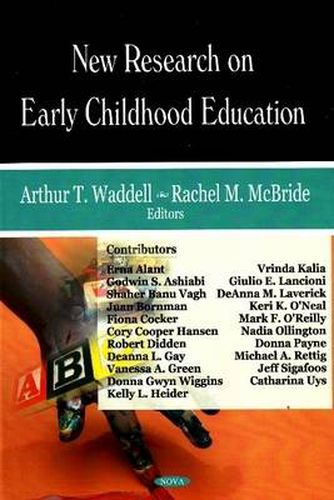Readings Newsletter
Become a Readings Member to make your shopping experience even easier.
Sign in or sign up for free!
You’re not far away from qualifying for FREE standard shipping within Australia
You’ve qualified for FREE standard shipping within Australia
The cart is loading…






Early Childhood Education spans the human life from birth to age 8. Infants and toddlers experience life more holistically than any other age group. Social, emotional, cognitive, language, and physical lessons are not learned separately by very young children. Adults who are most helpful to young children interact in ways that understand that the child is learning from the whole experience, not just that part of the experience to which the adult gives attention. Although early childhood education does not have to occur in the absence of the parent or primary caregiver, this term is sometimes used to denote education by someone other than these the parent or primary caregiver. Both research in the field and early childhood educators view the parents as an integral part of the early childhood education process. Early childhood education takes many forms depending on the theoretical and educational beliefs of the educator or parent. Other terms those are often used interchangeably with early childhood education are early childhood learning , early care and early education . Much of the first two years of life are spent in the creation of a child’s first sense of self or the building of a first identity. Because this is a crucial part of children’s makeup-how they first see themselves, how they think they should function, how they expect others to function in relation to them, early care must ensure that in addition to carefully selected and trained caregivers, links with family, home culture, and home language are a central part of program policy. If care becomes a substitute for, rather than a support of, family, children may develop a less-than-positive sense of who they are and where they come from because of their child care experience. This book presents the latest research in this vital field.
$9.00 standard shipping within Australia
FREE standard shipping within Australia for orders over $100.00
Express & International shipping calculated at checkout
Early Childhood Education spans the human life from birth to age 8. Infants and toddlers experience life more holistically than any other age group. Social, emotional, cognitive, language, and physical lessons are not learned separately by very young children. Adults who are most helpful to young children interact in ways that understand that the child is learning from the whole experience, not just that part of the experience to which the adult gives attention. Although early childhood education does not have to occur in the absence of the parent or primary caregiver, this term is sometimes used to denote education by someone other than these the parent or primary caregiver. Both research in the field and early childhood educators view the parents as an integral part of the early childhood education process. Early childhood education takes many forms depending on the theoretical and educational beliefs of the educator or parent. Other terms those are often used interchangeably with early childhood education are early childhood learning , early care and early education . Much of the first two years of life are spent in the creation of a child’s first sense of self or the building of a first identity. Because this is a crucial part of children’s makeup-how they first see themselves, how they think they should function, how they expect others to function in relation to them, early care must ensure that in addition to carefully selected and trained caregivers, links with family, home culture, and home language are a central part of program policy. If care becomes a substitute for, rather than a support of, family, children may develop a less-than-positive sense of who they are and where they come from because of their child care experience. This book presents the latest research in this vital field.